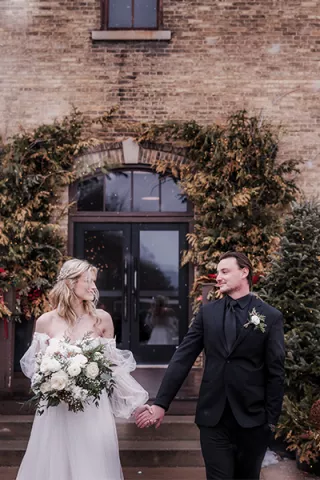This article courtesy of the Avvo NakedLaw blog
There is a certain element of divine intervention that comes into play on the afternoon of the Big Day. How else can 13 separate vendors arrive in the same place, on time and on cue? Unfortunately, problems with vendors are a component of any major social event, especially weddings.
One of the best ways to avoid a disaster down the aisle is to carefully review and negotiate the major terms of your contracts with each vendor. With a better idea of what you’re paying for, you’ll be able to protect yourself, your partner or whoever else might be footing the bill from the financial impact of a no-show or misunderstanding.
Below are several top tips for working with each type of vendor. As always, if you’re shelling out big bucks for a certain vendor and are unsure whether the contract terms are fair, do not hesitate to have a lawyer you trust look it over for red flags. There are even services that let you speak to a lawyer within minutes for just $39, so you could end up saving a lot of money in the long run.
1. The Dress
Most brides need at least a few alterations to make their dream dress fit like a dream. However, not all wedding dress retailers include alterations within the cost of the gown, and highly technical styles could wind up needing several adjustments as the wedding date approaches. Necessary undergarments, including a brassiere, bustier or sewn-in cups, are likely not included either. Check the purchase and order agreements carefully and make sure the salesperson answers all of your questions before you hand over the deposit.
2. The Caterer
Food is usually one of the most expensive aspects of your wedding, so pay close attention to the terms of your agreement. Of course, make certain the main details are covered: date, time and location. Then, clarify the number of guests and whether the food will be served buffet style or as plated entrees. Regardless of what you choose, you usually need to have a final headcount 2-3 weeks beforehand, so plan to receive your RSVPs in time.
Understand that if you do not provide an accurate headcount on the date required by the contract, your caterer is within his rights to stick to whatever number you initially provided. This can be especially problematic if there are too many guests and not enough dinners. If that happens, you will likely be charged for each extra meal at the regular rate, which will be significantly higher.
3. Music and Entertainment
Live music with instruments often requires highly specific logistics accommodations, particularly if you are hiring a vendor to perform outside. Your contract should clearly spell out acceptable locations for the band or quartet and outline what kind of power access the performers will need. Most bands will need to take a break at some point during the evening, so be certain the contract includes music coverage during these periods.
If working with a DJ, understand that his job is to play the music you request; otherwise, it’s at his discretion to keep the party going. If you have certain must-have tunes, let your DJ know ahead of time, especially if it’s an obscure band or lesser-known musical arrangement.
For either, remember that the total cost generally does not include gratuity, so budget accordingly.
4. Flowers
Like any other vendor, make sure your flower contract contains delivery times as well as acceptable replacements in the event your selected flower types are unavailable on the date of your choice. If you arrive on location and cheaper, less-appealing flowers are serving as stand-ins, you are owed the difference between what you agreed upon and what you received. The cost can be significant if, for example, you signed for French tulips but dined over dandelions. Also, never assume the florist will arrange or set up any of your flowers, and be sure to iron out this detail in advance.
What to Do if There's a Problem
Step one: Breathe.
Step two: Refer to the contract. Handling a problem with a vendor can be solved any number of ways, depending on the nature of the blunder. Let’s take flowers, for example. Say you paid your florist $3,000 to cover the cost of your bouquet, bridesmaids’ bouquets, corsages and all the flowers at the ceremony and reception. You paid $1,500 in advance and still owe $1,500 on the day of the wedding. The unthinkable happens, and the florist cancels five days beforehand. Somehow, you are able to find a replacement on a moment’s notice, but he wants $4,500 to cover the last-minute job.
Under the law, your original florist owes you not only the balance of the original contract but also the additional cost of securing a second vendor to “cover” the unfulfilled terms of your original contract. Therefore, your florist owes you a $1,500 refund plus an additional $1,500, the difference between the original $3,000 contract and the new $4,500 cover contract. He also must reimburse you for the cost of any incidental damages incurred along the way, such has having to hire extra help to arrange the flowers on the day of.
As with any contract, if the terms are not met, you have the right to cancel, walk away or seek compensation for any extra money you had to spend beyond the terms of the original agreement. On the flip side, canceling on a vendor last minute could run you into major cancellation fees or even require you to pay the balance of the agreement.
When it comes to weddings, vendors and even marriage itself, pick your partners carefully and read the fine print.
 Avvo makes legal easier by providing free answers from lawyers, client reviews, and detailed profiles for 97% of all licensed attorneys in the U.S., so you can find the lawyer who’s right for you. Avvo Advocates write about legal issues in everyday life on the Avvo NakedLaw blog.
Avvo makes legal easier by providing free answers from lawyers, client reviews, and detailed profiles for 97% of all licensed attorneys in the U.S., so you can find the lawyer who’s right for you. Avvo Advocates write about legal issues in everyday life on the Avvo NakedLaw blog.














